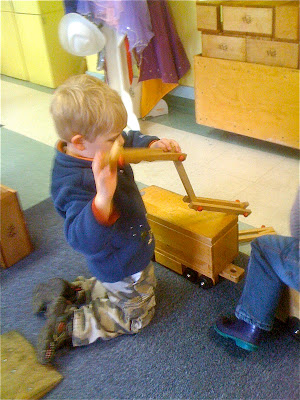
We either make ourselves happy or we make ourselves miserable. The amount of effort is the same. ~Carlos Castenada
I do not want what I haven't got. ~Sinead O'Connor
We like to think of young children as living in the moment. Indeed, I've written a number of posts here in which I assert that this is why I most love working with them: they are a constant reminder that
Now is the only thing that exists. And they are much, much better at it than are adults with our wizened brains that spend too much time dwelling in the dream worlds of the past and future. This is not to denigrate the warm fuzziness of nostalgia nor the hot excitement of anticipation. And only a fool doesn't learn from the past and plan the future, but you can't live there for long and avoid the twin plagues of regret and worry, the seeds of all misery.

Now is the dwelling place of happiness. I think that's what we see when we watch children play and wish to be like them. We've all sat in awe of a child immersed in an art or sensory or dramatic play project. If it's concentration we're witnessing then it's of the deepest and broadest variety, one that makes a universe from painting on paper or the process of repeatedly letting flax seed drain from between our fingers. These are moments around which religions and philosophies are spun. It's called bliss or nirvana or heaven or love.

Now is also the dwelling place of the other people, not just the speculative ones that may or may not exist in the past or future. As teachers and parents we spend much of our time, and even more of our energy, helping children learn appropriate ways to settle disputes, treat friends, and participate in a group, be it a family, classroom or larger community. We're at our best in this when we ourselves are able to enter into the universe of these actual, albeit smaller, people, to fully engage in the flax seed draining from between the fingers of Now. It's not always pleasant, it's an emotional place sometimes, and it's often hard to remember that feelings only exist for right now, not as eternal amplifications of our own emotional history. It's through the ability to become fully present that we are able to see that their feelings are not our feelings, that their conflict is not our conflict, that their friendship is not our friendship: that is the reality of Now. We are not there to fix things, but rather to help them find their own course through their emotions and conflicts and back toward the blissfulness that is the heart of Now.

We have a few large, sturdy wooden vehicles: only four train cars and two busses, making them, on some days, a scarce resource, invitations to conflict over "turns." They're fun for pushing and riding: on this day we were riding in circles on a raised track made of large blocks. As others moped over having to wait for their turn I spied one guy playing with one of the two strange apparatuses that we store on the same shelves as the vehicles: they're lengths of wood hinged together in four sections, items of unknown purpose or origin.
I said, "You're playing with that thing."
He answered, "It's my truck."
While the rest of Now was rife with unsatisfied desires, disappointment, and conflict, he had, in the midst of it, satisfied himself from within. I left him then, stepping back to watch from a distance. As he manipulated this thing that looked nothing like a vehicle, I wanted to be where he was, a universe in which trucks were exactly as plentiful as they needed to be. He made gentle motor sounds with his lips as he guided it from one end of the rug to the other. Once there, he inadvertently set up shop for a time right in the path of the vehicles going around and around.
"Hey! Get out of our way!"
He didn't hear it, although it had been unnecessarily shouted.
"Move!"
"He won't get out of our way!"
He continued to make those soft motor noises, while carefully watching his truck go through its machinations. Finally, one boy leaned right down into his face and said, "You better move or I'll be mad at you!"
His bliss was broken then. He looked at the children lined up on their vehicles waiting for him to make way.
I probably should have stayed out of it still, but I said to the boy who had threatened his anger, "I think it works better to ask people politely."
He relaxed his eyebrows, "Will you move, please?"
There was a long moment as this question hung. Finally the boy with the imaginary truck responded by scooting backwards a bit.
As the children filed past, each of them said, "Thank you," as a kind of toll.
Somehow in this process the boy wound up in sole possession of one of the coveted "real" vehicles, although he had never asked for it, and had, in fact, only laid a hand on it to move it out of the way as well. He sat back with it in his lap, not possessing it, but merely being with it. I'm certain that had another child asked for it, he would have handed it over as easily as it came to him.
And that's how we all achieved nirvana, a place where trucks are exactly as plentiful as they need to be.